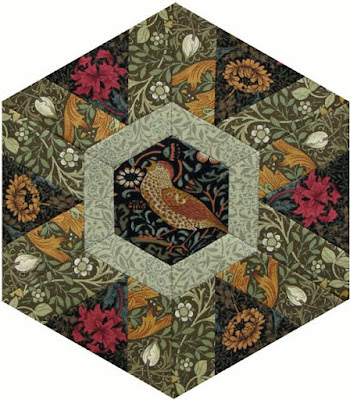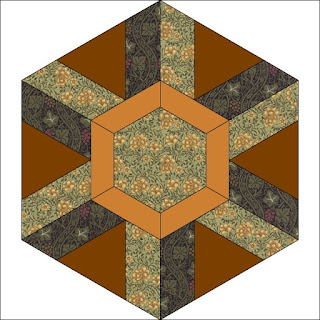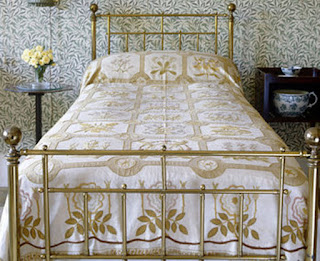Morris Hexathon 26: Floating Clouds by Becky Brown
She says she's finished her first marathon.
A little Photoshopping of the Salt Lake Marathon.
Our last hexie is Floating Clouds, a hexagonal block from the 1930s given the name in the Kansas City Star.
Philip Speakman Webb 1831-1915
It's a good pattern to recall architect Philip Webb, one of the Morris circle, a life-long friend and partner in design, whose most famous house is called Clouds.
Webb and Morris met when both worked for London architect George Street as young men. Morris quit architecture to become a painter, and then a designer, and then a political activist, etc. But Webb pursued a successful career designing arts and crafts commercial, ecclesiastical and residential buildings.
Clouds House in Wiltshire
He designed the Red House for William Morris himself about 1860. Their tandem thinking is illustrated by the fact that they were the two founders of the SPAB, the Society for the Preservation of Ancient Buildings.
http://www.nationaltrust.org.uk/standen-house-and-garden
Standen is dressed to look as it did in 1925 featuring the Morris wallpapers, rugs, embroideries and details.
Light fixture at Standen by Webb
The Morris Firm, first called Morris, Marshall, Faulkner & Company, had seven principal partners.
Ford Madox Brown, Edward Burne-Jones, Charles Faulkner, Dante Gabriel Rossetti, P. P. Marshall, William Morris, and Philip Webb: "Fine Art Workmen in Painting, Carving, Furniture and the Metals."
Webb designed furniture and accessories for Morris, Marshall, Faulkner & Company while incorporating their decorative items into his architectural commissions.
Those Wild Wyndhams by Claudia Renton (2014) tells their stories.
Read about Standen here:
http://www.periodproperty.co.uk/ppuk_discovering_ppom_201004.shtml
See more of Margaret Beale's embroidery here
https://nttreasurehunt.wordpress.com/2011/06/10/william-morriss-influence-at-standen/
And read about Clouds House in this study of arts and crafts architecture by Caroline Dakers: Clouds: Biography of a Country House. See a preview here at Google Books.
Webb designed furniture and accessories for Morris, Marshall, Faulkner & Company while incorporating their decorative items into his architectural commissions.
Perhaps the most notable: the adjustable Morris chair,
which Webb designed in the 1860s.
Morris Hexathon 26: Floating Clouds by Ilyse Moore
You need 5 pieces, a hexagon, a tumbler, a triangle
and a parallelogram flipped.
BlockBase #249
This week's quilt pattern was published in the Kansas City Star in November, 1938.
Pattern for an 8" Hexagon
(4" sides)
To Print:
- Create a word file or a new empty JPG file that is 8-1/2" x 11".
- Click on the image above.
- Right click on it and save it to your file.
- Print that file out 8-1/2" x 11". The hexagon should measure 4" on the sides.
- Adjust the printed page size if necessary.
- Add seams when you cut the fabric.
The Willow bedroom at Standen.
We can assume Margaret Beale and her
daughters embroidered the coverlet.
Clouds House is not open to the public. The house figured in many romantic tales of the Bloomsburies and Arts and Crafts notables. John Singer Sargent painted the Wyndham's daughters in 1899.
The Wyndham Sisters, detail.
Collection of the Metropolitan Museum of Art
Those Wild Wyndhams by Claudia Renton (2014) tells their stories.
Read about Standen here:
http://www.periodproperty.co.uk/ppuk_discovering_ppom_201004.shtml
See more of Margaret Beale's embroidery here
https://nttreasurehunt.wordpress.com/2011/06/10/william-morriss-influence-at-standen/
And read about Clouds House in this study of arts and crafts architecture by Caroline Dakers: Clouds: Biography of a Country House. See a preview here at Google Books.

















Great looking block but that is one heck of a lot of awkward Y seams! It might be easier to hand piece it. Any tips from the redoubtable Becky Brown?
ReplyDeleteMany thanks Barbara - enjoyed it all, well, maybe not the curves so much!! xx
ReplyDeleteThank you for the enjoyable ride Barbara. What a memorable trip you, Becky and others created.
ReplyDeleteThis has been a great project that I have really enjoyed. Thank you so much Barbara for a wonderful challenge. Each Saturday I looked forward to seeing what the very creative and skilled Becky would come up with as the sample block. Thanks again.
ReplyDeleteThank you so much for this journey. I haven't been able to keep up but am still travelling. My quilting journey started about 10 years ago through a love of William Morris. My brother was working on an exhibition of Morris treasures at a museum here in Australia. At the same time my daughter was working at a publishing house that featured one of Michelle Hill's beautiful Morris inspired designs. I started quilting (and haven't stopped). I love the effort you put into your research and have copied each chapter to make into a book I can reflect on.
ReplyDelete